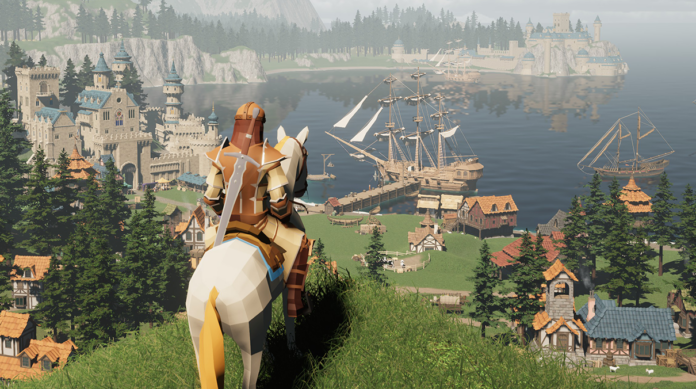Canadian developer Lincoln McCulloch, working under the studio name Uncle Grouch Gaming, spent the last five years creating the upcoming Dungeons & Kingdoms. An ambitious game that combines medieval city building and kingdom defense with ARPG combat and monster hunting. “So, I basically made the game I’ve always wanted to play,” says McCulloch. The fact that it took him over five years to get to the point that it’s nearly ready for Early Access is largely due to learning the ropes of game development along the way.
He was working as a software developer while also making independent films and playing in a band before McCulloch turned all his time and attention to game development. Now, it totally consumes him. “This is easily the most work I’ve ever done, and it goes on that way for years,” he explains. “There are no days off. There are no holidays. You get so deep into the design and being consumed into the headspace of what you’re doing that taking time off just doesn’t work.” The game will launch in Early Access soon and has quite a journey ahead still. “Once D&K is completed, I imagine I’ll be able to properly reflect on everything. Now I just keep going.”
Why did you become a solo developer?
“I’ve always wanted to get into game development and I tried it on the occasional evening or long weekend over the years while working as a full-time software developer, and while having a very busy personal life. But I learned early on that getting into game development required more focus and headspace than I had time for with my other commitments.”
“Then my primary work contract changed to part time, and still paid me enough to live. I then had enough time to focus on game dev, so I made the decision to start changing careers. I had no interest in changing jobs to work in the game industry as that just didn’t appeal to me at the time. Also, I didn’t have enough funds to think about hiring anyone at the time so there was only one option: going solo.”
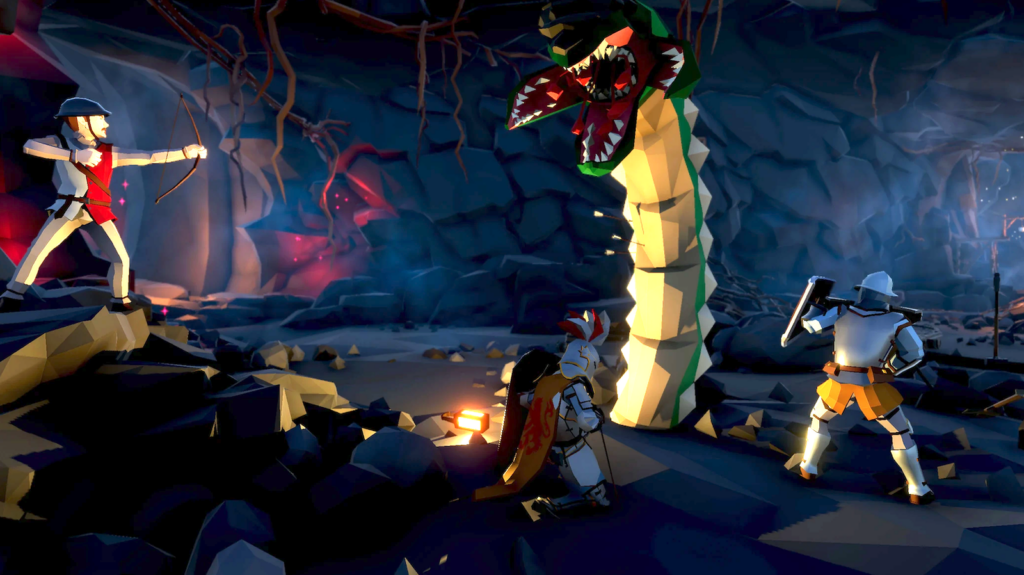
“There wasn’t a conscious decision made where I only wanted to work by myself, it was just the only way I could make it happen. I didn’t really think about what it meant to be a solo dev, I just focused on what I wanted to do which was learn how to make games. I knew plenty of software devs, even some that were making games, but they worked for game companies. Most of my social friends were musicians, and barely any of them were even gamers. So, I was on my own.”
What are the biggest advantages of working solo?
“The main advantage I can think of is there is no other overhead to consider, no other costs. Apart from that I don’t think there are many advantages. Making games is such a creative process, and I believe creativity always benefits from multiple people providing input and perspective. Can you make games as a solo dev? Definitely. Would it be better with a great team? Definitely! But being a solo dev, I can also iterate very quickly. I don’t have to ask someone else for their artwork, or their code. If I have an idea that I want to try I just do it. If I want to change things and make a huge mess, I can without bothering anyone else.”
And the biggest pitfalls?
“The biggest pitfall is time. Game development is the most time-consuming thing I’ve ever done. To give it some perspective… I’ve run my own software company where you can end up working 7 days a week for months. But that usually goes up and down, and you can expect to not work every weekend. I’ve done some indie filmmaking which I then thought was the most ridiculous amount of work any one person could ever do. All the different jobs you have to do, all the different technical aspects you have to understand, all of the personal aspects dealing with actors etc. There’s a reason why movies have a list of 200 people in the credits, and I now have respect for every single movie ever made, good or bad. Working crazy amounts of overtime in some regular office job was a cakewalk in comparison. With filmmaking it is a crazy amount of work by default, and only goes up from there.”
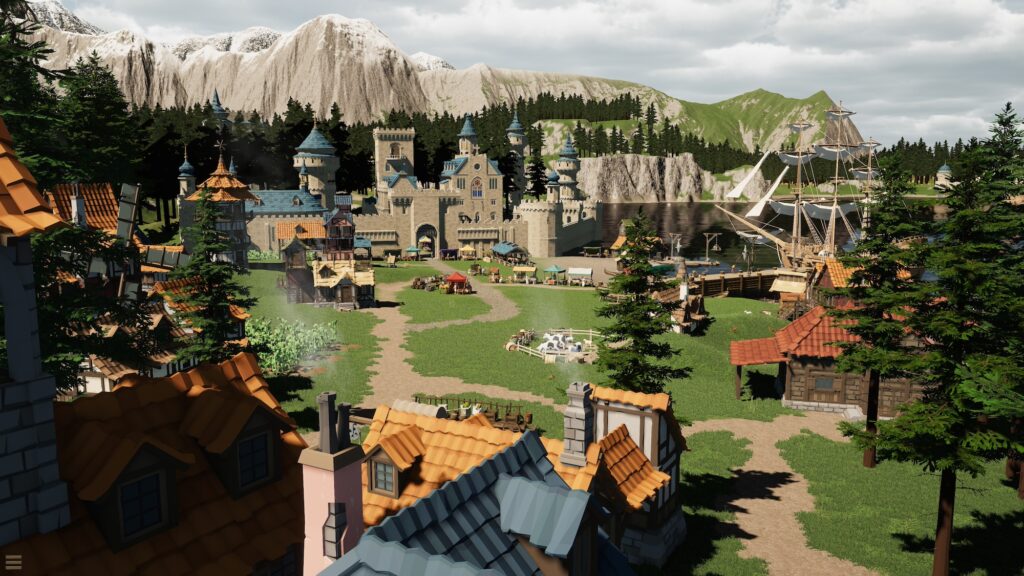
“Then I got into game development and that made filmmaking seem like a cakewalk. It of course depends on the type of game you’re making but trying to be a solo dev on something the scale and scope of D&K is easily the most work I’ve ever done, and it goes on that way for years. There are no days off. There are no holidays. You get so deep into the design and being consumed into the headspace of what you’re doing that taking time off just doesn’t work. Sure, I could not work for a day, but why? All I would do is think about everything I’m not getting done and I’d know that’s one more day of work I have to add at the end. Any time off means you delay your game by that much time, or cut features, or reduce quality. I suppose you could just settle on your game taking 10 years to make so you can still have a life, but that doesn’t work for my brain.”
What’s your creative process?
“I use several different approaches which usually depend on the scope or impact of the feature. I have a large whiteboard beside my desk when I need to visualize things quickly. It may start as a feature to ‘walk through’ the design, where that documentation is immediately obsolete as I write it. I have my own local wiki for game development so I keep all my notes, documentation and screenshots on there that I can reference.”
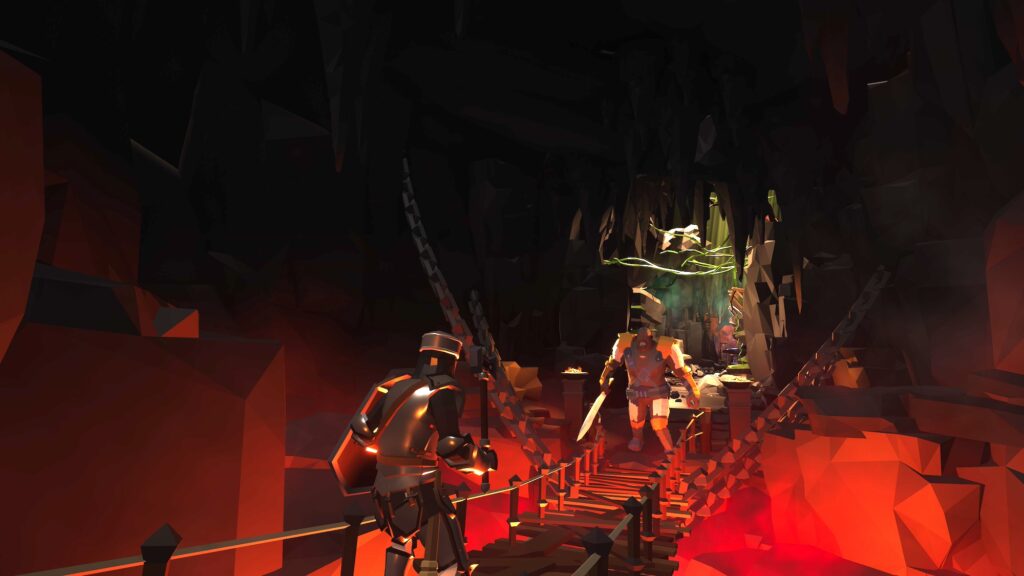
“Also, I chat with other game devs occasionally. I have a small group of indie dev contacts over discord, or in very rare cases I’ll post on public forums to get some insight or feedback, but that’s usually for technical issues. Now that I’m working with a publisher that has a strong interest in seeing indie devs like me succeed, I talk through some things with them and share alpha builds, screenshots etc. Now I also have a small group of beta testers, so I try to keep them supplied with the most recent builds to get their feedback.”
“I will also do a lot of research when needed. That includes reviewing other games, watching videos, reading books etc. I don’t really play games so much anymore as I do review them to see how they are implementing features, and reading what their community has to say about it.”
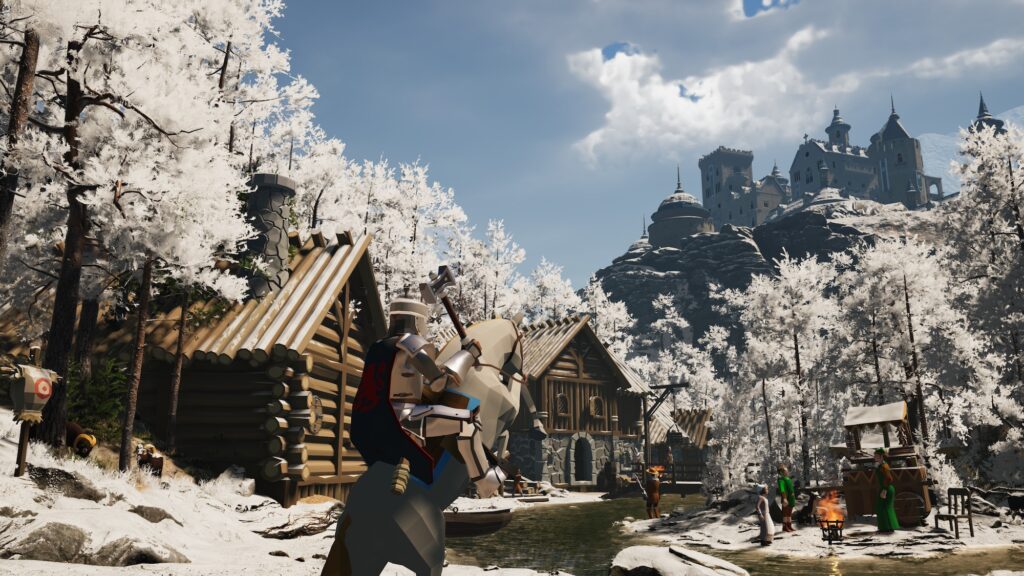
“That brings up one word of warning for other future game devs. Never mind not being able to find time to still play and enjoy games but realize once you go looking under the hood into how games are made you will look at games differently. It was the same thing with filmmaking. Now that I have a solid understanding of how movies are made, I watch them through a different lens. Ignorance is bliss and you can’t go back.”
How do you stay motivated through (5+ years of) development?
“On one hand it’s simple, you don’t have a choice. If you don’t stay motivated, you fail and you won’t be able to continue doing what you’re doing. That’s just not acceptable to me. It isn’t about money or recognition or any other external motivation, it’s about wanting to keep doing something I am passionate about doing. On the other hand, motivation isn’t needed. I chose to do game development because I’ve always wanted to do it. Now I’m doing it and I love it. I wouldn’t be satisfied just doing it as a hobby, so no motivation needed.”
Will you ever work in a team or is it only solo for you?
“I definitely want to build a team. I’m not a solo dev because I think that is better, I’m a solo dev because I can’t afford to hire anyone at this point.”
How did you get the idea for Dungeons & Kingdoms?
“The short story of my game development journey so far has gone through three themes, but they were all first/third person action/RPG focused. It started off with a WW2 themed game. Tons of vehicles, very combat and action focused. I used that theme to learn the basics. As I became educated enough to the point of being able to grasp the scope of an actual game, the WW2 theme design I wanted to do ran into some problems. To make the game the way I wanted to make, it would also need a strategic world map element, countries at war, units moving etc. I decided that was just way too much for a first game.”
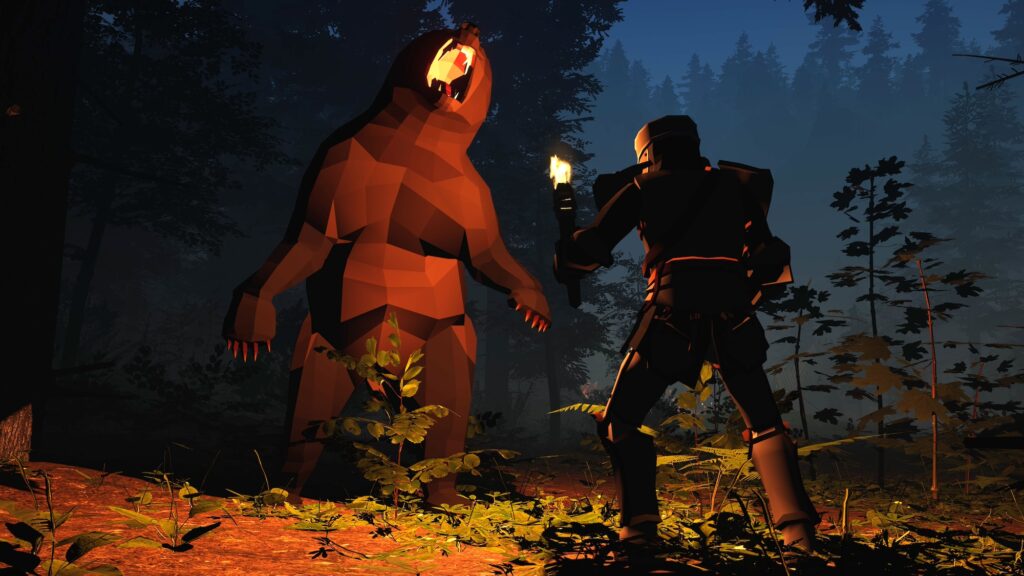
“The next theme was a modern-day zombie game, vehicles, action focused etc. I continued to learn and experiment with things like larger open worlds. This is when I first started really digging into world building. That is where the focus shifted somewhat from the technical aspects of game development to the creative aspects of story, writing, characters etc. As the overall design came into focus, it started to highlight some issues on the technical side in that trying to make a modern-day zombie game requires a massive amount of detail creating the cities and environments.”
“Overall the idea for D&K came out of all of the world building effort I put in on the previous projects. I don’t want to share the specifics of the story now as that’s to be discovered when playing D&K, but the storyline works for a medieval fantasy setting. Also, playing games like Mount & Blade which I love, I always wanted to see more city-building. The combat is great and the campaigns are fun, but after a bunch of huge fights I wanted to go back to my village, chat with my villagers and relax. I’ve played several similar games that either had awesome city building or colony sim, or great combat and adventures, but not both. Why can’t they have both? So D&K is basically the game I’ve always wanted to play. City building, colony sim, RPG adventures, combat and made from the start for single player.”
What makes the game unique?
“What makes D&K unique? A few things perhaps… Like the lack of UI. There are no progress bars in the world. You don’t watch UI elements waiting for things to happen, you watch what the people are doing, or what is happening in the world, or by talking with people. If you can see something you can interact with it. The idea is there are no fixed props just for show. Everything should feel like it really exists in the game world, and it makes sense. For example, if you see some random bottle on a table, you can pick it up. Maybe throw it at that guy over there sitting in the chair. He’ll probably get mad and say something about it.”
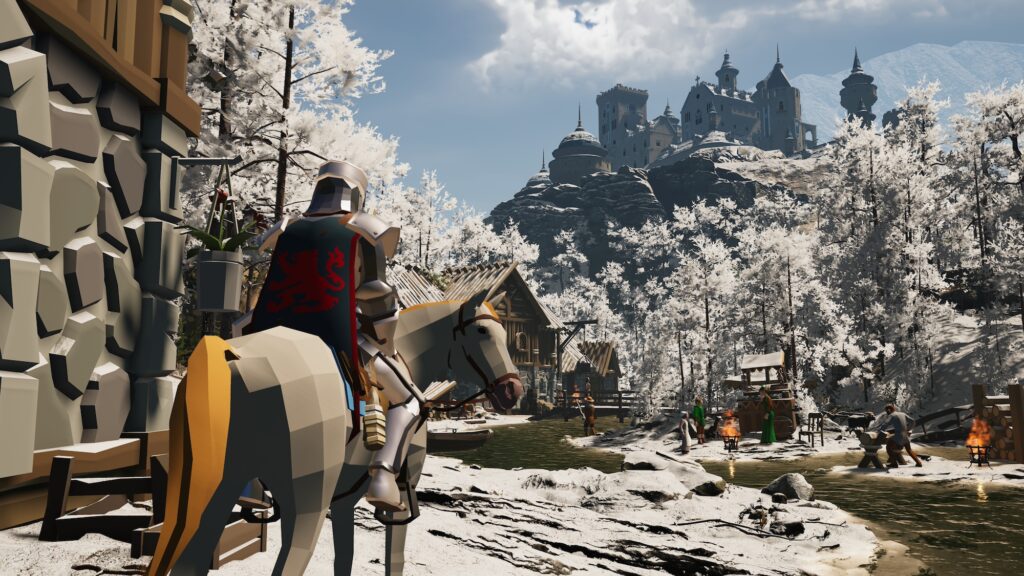
“Every object exists somewhere. Do you need to pick up a stone to make a tool? That stone is now in your hand, and you can see it. Is there a basket of apples? You can see the apples in the basket. Drop the basket on the ground and you can see all the apples spill out. Every object in the world has a place. It isn’t about trying to restrict what players can do such as limiting inventory space in a backpack, it’s about the world being believable and making sense. You don’t need the game to pop up UI alerts everywhere telling you why things are the way they are, you should be able to look at things in the game world and just know what is happening because it just makes sense.”
How did you decide on the visuals?
“There were two major factors in choosing the visual design. Availability of compatible models and performance. With Dungeons & Kingdoms being my first game I was aware of performance concerns. It made sense to me that lower polygon models and mostly solid color textures would make things easier when the time comes to tackle optimization. And being a solo dev who is focused on coding, I didn’t have the time to make hundreds of 3D models so when looking at what was available to purchase, the low poly market was well stocked making it the best choice.”
“I wanted to then push the low poly world to be a more realistic visual, especially around things like the sky, ocean, the vegetation and ground textures, as well as using low poly models with high levels of detail when possible. It was also about trying to create a stylized visual that I wasn’t seeing in other games.”
What’s the biggest lesson learned from this project?
“Not sure I’ve learned the lesson yet, but I am sure it’s coming. Once D&K is completed, I imagine I’ll be able to properly reflect on everything. Was it worth giving up years of my life? And was it worth sacrificing or missing out on relationships? Was it worth investing my savings and incurring debt? If I could go back in time, I would probably try to convince myself to start off the way everyone with experience tells you to start off – by starting with small games and working your way up to bigger ones. But that’s like old people giving advice to young people. They never listen, and I didn’t either.”
The toll on your mental health can be quite high for solo developers. How do you deal with that?
“I think you have to be comfortable with being alone and not having much of a social life. By that I mean it should fit with your natural personality. I’m a pretty typical introvert, which I learned years ago when I was in technical college. I remember when I learned what an introvert was, and that I wasn’t the only one like that, and that it was okay to be like that, and I felt so relieved. Finally I was okay with who I was, as I always questioned why I wasn’t like other people out there chatting with everyone seeming to have fun all the time.
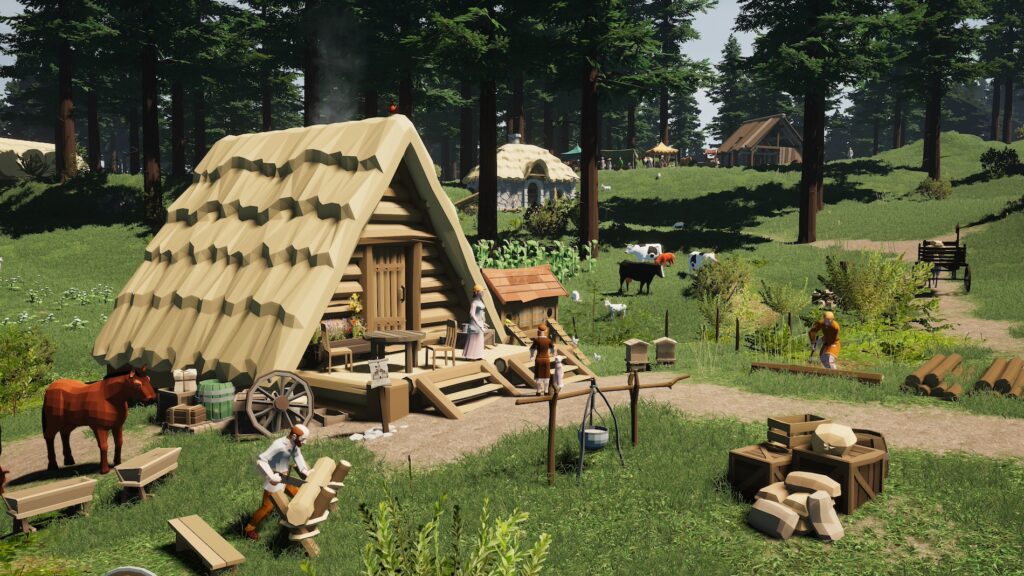
“Can’t imagine what it would be like being an extrovert trying to deal with the isolation of working solo for so long! I’ve always been very comfortable being on my own or doing things by myself where I often have to force myself to go out and be social. It helps having been a musician that still plays in bands and does live shows which usually gives me enough social contact.”
“But it can be hard at times. I’m sure it depends on the size of the project, but when you’re a solo dev on a large project that takes several years to make, you’re going to have challenges. You’re going to have times where you think it’s too much and you should just give up. You’re going to question your choices. But then you realize there’s nothing else you’d rather do, so you just keep going.”

